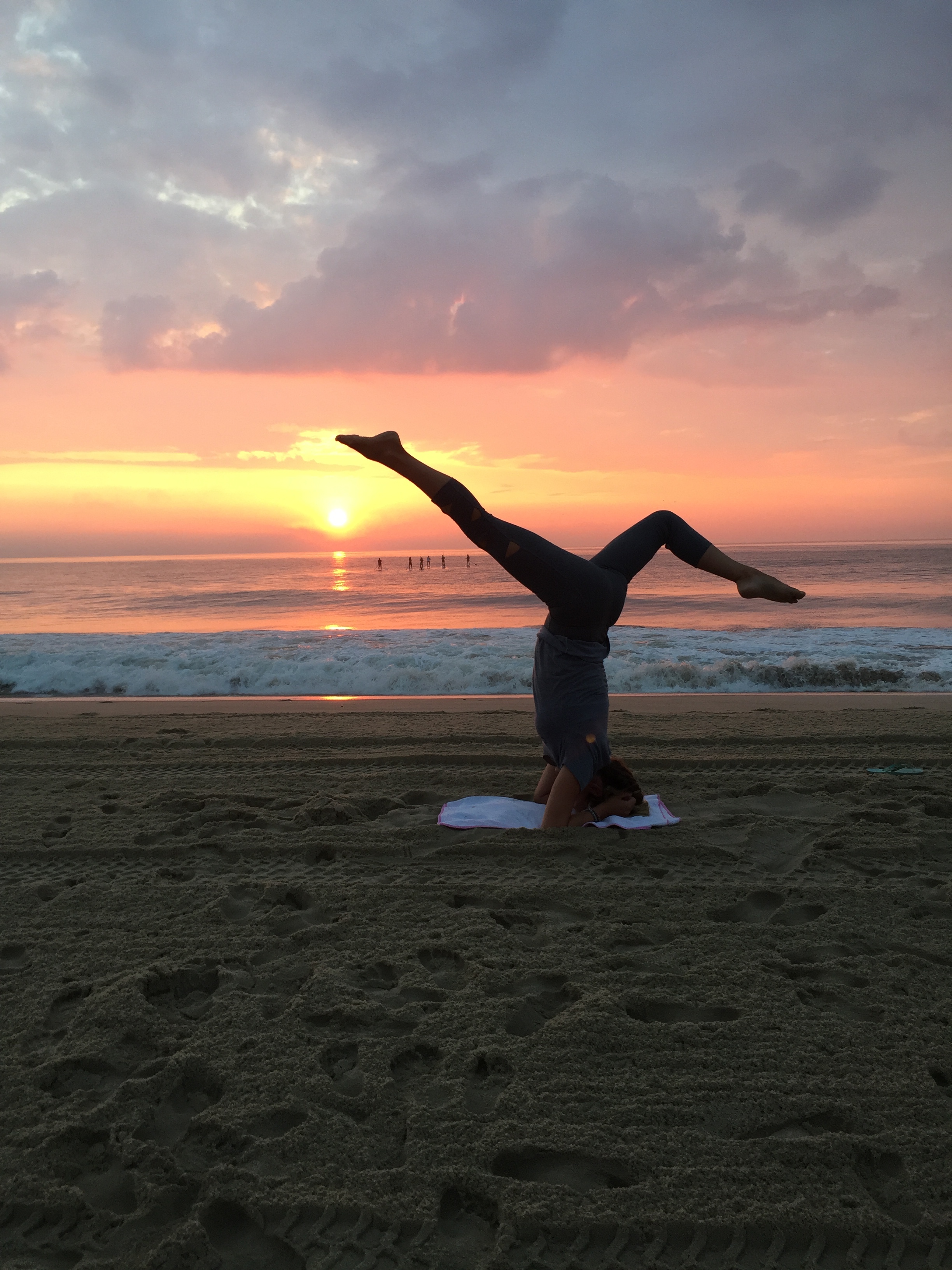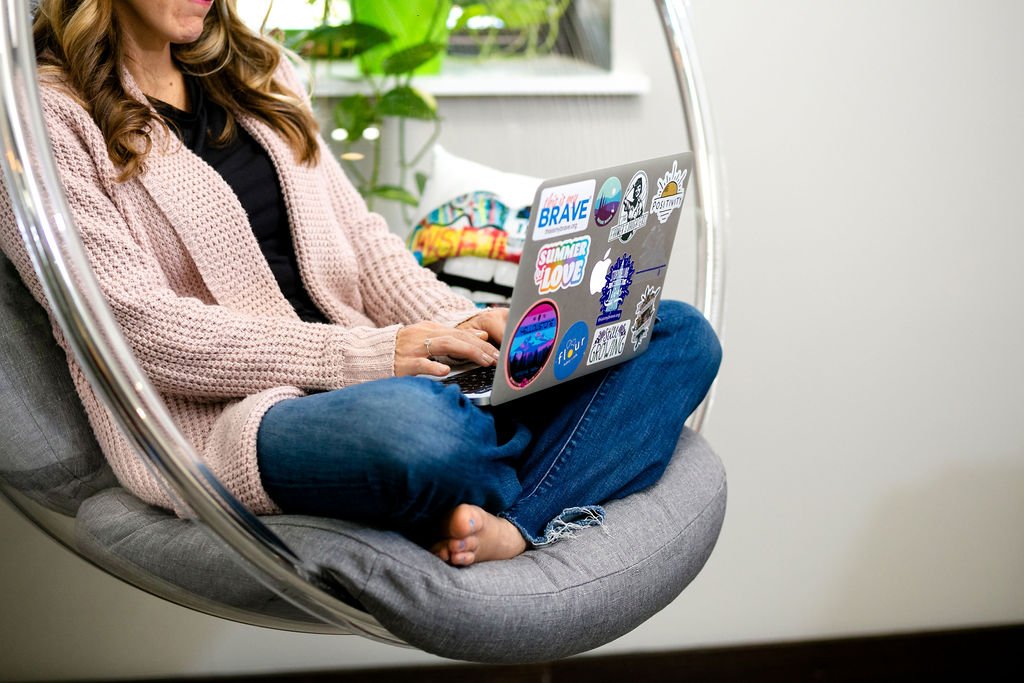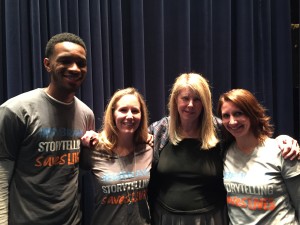If we never make it past the small talk to really open up to a friend or neighbor about our depression, or our anxiety or our eating disorder or whatever it is that we’ve hid for so long because we were scared of being judged, then how would our friend ever be able to love us as who we are?
Read moreThis old blog
Five years, four months of my life is documented on my first blog. My blogging training wheels. When Vivian turned eight months old, I made a decision to tell my story. From the beginning I wanted to write openly, with my real name attached to my writing. But time and again I was advised to stay anonymous. Think of the children, they said. What if a mother of a child in their school finds your blog and won't let their kids play with yours because you're bipolar?
Read moreSetting My Writing Intention
I am living proof that just because a person is living with a mental illness doesn't mean they can't work hard to manage it well and this blog is my way of giving back.
Read moreA chance encounter with a dragonfly
As if to greet the little guy, I held out my right index finger, offering another place to explore. He surprised me by hopping over to sit on the first knuckle of my finger.
Read more10-years of blogging
Live a brave life.
Read moreChristmas In A Psych Ward
My daughter and I on her 4th Birthday in December, 2014
Twelve years ago I spent Christmas in a mental hospital. Just like Elsa in the movie Frozen, I lived the “Conceal, don’t feel” mantra with friends and extended family. I was terrified of being different, being labeled, being judged.
Read moreI Landed in the ER after watching '13 Reasons Why'
Four days ago I finished watching the Netflix series ‘13 Reasons Why’ and drafted an opinion piece which I published Monday morning. The show rocked me to my core. So much so, that I landed in the Emergency Room of my local hospital. This is the story of how and why that happened.
 I live with type 1 bipolar disorder. For those who aren’t aware of the various types of bipolar disorder, Bipolar Hope Magazine is an amazing resource and they have an informative section on their website which describes the types of bipolar and different symptoms. In a nutshell, my type of bipolar disorder means that I lean towards the manic side of the condition. If I’m not careful to protect my sleep, I could find myself launching into a manic episode. It doesn’t happen overnight, rather, over the course of several nights of getting little to no sleep.
I live with type 1 bipolar disorder. For those who aren’t aware of the various types of bipolar disorder, Bipolar Hope Magazine is an amazing resource and they have an informative section on their website which describes the types of bipolar and different symptoms. In a nutshell, my type of bipolar disorder means that I lean towards the manic side of the condition. If I’m not careful to protect my sleep, I could find myself launching into a manic episode. It doesn’t happen overnight, rather, over the course of several nights of getting little to no sleep.
As I mentioned in my opinion piece, I put my mental health at risk by choosing to watch the show. I didn’t know how risky it was to begin watching the show because I’ve been mentally healthy for the past 7 years. The last time I was hospitalized for a manic episode was, ironically, exactly seven years ago this month, when I was 5 weeks pregnant with my second child. I thought since I had been so stable for so long, it couldn’t possibly be that risky to watch a few episodes.
I was wrong.
I started watching the show Friday evening, and got through four episodes (binging) before forcing myself to shut it off so that I could get some sleep before flying to Cedar Rapids, Iowa for my nonprofit’s show the following night. Our Iowa Corridor This Is My Brave show was incredibly moving and inspiring, as all of our shows are, and I was so excited to get to spend time with the show’s producers and cast members afterwards. We went out to a local bar and played Cards Against Humanity while eating and hanging out. I had a blast. But unfortunately didn’t get to sleep until 2am EST, and awoke at 6am Sunday morning. I usually sleep well when I’m on the road, but I had so much on my mind having started watching the show the night before and wanting to continue watching.
I pushed play on episode 5 shortly after waking up, and was able to finish the series in the airport on my way home on Sunday. I was furious by the time I finished, and reached out to several of my friends via text to see if they had watched and to get their thoughts. Everyone seemed to have similar feelings, but slightly different reactions. Overall, the few people I was able to connect with directly were shook up by the show, but were glad it was out and was opening the eyes of the public.
At that point I began thinking about those in my circles who were already vulnerable, sensitive. How would they take it if they had watched? How would teenagers react to the show? Especially if they didn’t have solid support systems in place, if they were already in a tough place, if they didn’t have the energy or resources to access proper mental healthcare.
I landed around 8:30pm and grabbed an Uber home. I normally enjoy chatting with the driver, but on this particular ride I needed to connect with one of my close friends. I called my This Is My Brave Co-Founder Anne Marie Ames. She and I have been friends for four years, and I needed to tell her how the show affected me. We talked the entire ride home, and agreed to catch up again during the week.
My husband had let our kids stay up late so they could see me, so I hugged and kissed my little people and got them tucked in by 9pm. My husband knew how I was feeling because I had called him from the airport, and he knew that I wasn’t sleeping well. The plan at that point was to focus on sleep all week, make it a priority again. On the flight home from Chicago I had jotted down my feelings and initial reaction to '13 Reasons Why', and I told him I felt that if I was able to get them organized into a piece that made sense, I’d likely sleep better. I started pulling my thoughts together, tapping away at my laptop, and he went up to bed.
I crawled into bed around midnight, as it had taken me longer than I had hoped to draft my reaction. But I did feel better once I got it out, so I was hopeful I’d be able to get some quality sleep.
Only, instead of crashing and sleeping hard, my sleep was broken and riddled with nightmares. I woke at 5:30am, and since my husband was already downstairs doing his normal early morning workout in the basement, I grabbed and pen and paper and let my feelings flow again. I shot off a draft of my revised piece to two friends and by then it was time to wake the kids and get them off to school.
I recognized my symptoms of hypomania and immediately told my husband that I was going to call my psychiatrist at 8:30am when they opened to get an appointment. He said that he thought that was a good idea and off my family went to work and school. I normally find relief in the calm of the morning once the house is quiet and I’m on my own. But instead I found myself feeling that familiar current of mania beginning to rush through my blood and anxiety creeping in.
I still hoped I could relieve some of these symptoms by publishing my reaction to the show. I felt a little better after hitting Publish on Medium, but things escalated quickly from there.
I picked up my kids from school and took them out for frozen yogurt, one of our favorite treats. I hadn’t seen them all weekend, so it was fun to catch up. As we were sitting there, Kelly, my best friend from college called to see how our Cedar Rapids event had gone. I told her it was amazing, as all our events are, but that I had a lot on my mind. She caught on immediately that I wasn’t in a good place, probably based on the tone of my voice, but I told her I couldn’t talk because of where we were and the kids were with me. She offered to pick up the groceries I said I’d be running out for later that evening, so that I could head to bed early instead. She agreed to meet me back at my place in ½ hour.
{One of the things Kelly asked was critical for her to know how I was doing mentally, and she knows this from being there when my very first manic episode came on back in December of 2005. She asked me where I was on a 10-point scale. I was at a 6-7.}
When a person with type 1 bipolar is at a 6-7, it means that they’re in a hypo-manic state. A person can very quickly go from a 6-7 to a 9-10, meaning they need to be admitted to a psychiatric hospital, if things aren’t addressed in an urgent manner.
Once we were home, I did my best to summarize for Kel why the show '13 Reasons Why' affected me so deeply. She’s a teacher, and hadn’t heard of the show, but when I told her how I had met a friend of mine for coffee that afternoon, she had a better understanding. The friend I met up with had been directly impacted by suicide, as her son Jay took his life last year, and now the family is pursuing a lawsuit because Jay’s guidance counselor had been alerted by a friend three weeks before he took his own life. The counselor had neglected to contact Jay’s parents. You can read about it in the Washington Post.
Little did I know, Kelly had already set an emergency intervention plan into place, even though she may not have noticed it at the time. While she was picking up the groceries for me, she called my husband and let him know that she was concerned about me. She also texted another one of our close friends from college who had a friend who was a pharmacist. (What can I say? It takes a village.)
When Ben got home, he found the kids happily playing video games, while Kelly and I were sitting in the dining room trying to figure out a plan. I needed Ambien to ensure that I got a solid night’s sleep. The only problem was that I hadn’t used a sleep medication in seven years, so we didn’t have anything (expired or otherwise) in the house. We called my psychiatrist’s office to see if we could get through to an after-hours line. We left a message for my doctor’s medical assistant, but by then it was already 6pm and we were running out of time. We called my regular pharmacy, but my psychiatric medication info was out of date. (Side note: I use a mail-order pharmacy to fulfill my regular mood stabilizer prescription which I’ve been on for the past 7 years at the same dose.) The pharmacist at my regular pharmacy recommended an over-the-counter sleep aid, but we weren’t convinced that would work for me given my level of hypomania.
Our friend who is the pharmacist (in California) communicated by text that if I didn’t have Ambien on hand at home, I would need to go to the Emergency Room to get a prescription for it, and that was what she recommended given my symptoms. I argued it was overreacting, but based on my experience living with this condition for eleven years now, and my past 4 psychiatric hospitalizations for mania, I also knew she was right.
Kelly offered to drive me to the hospital while Ben held down the fort at home. I resisted at first, as it seemed dramatic and unnecessary. I wanted to just get an OTC sleep med, and said we could get Ambien the next day from my psychiatrist. But looking back now, it's a good thing I didn't resist as I could have ended up in handcuffs again, being carted off to the Emergency Room and then the psychiatric hospital. I didn't want my kids to have to see that happen, so I happily went along with the intervention plan.
We joked on the drive over about how efficient my intervention team was and how I was voting her President of the team based on her stellar performance. (In college, Kelly was President of the water polo team and I was Vice President, so it seemed fitting.) We were immediately admitted to the ER, the intake nurse took my vitals, and I was sent back to a triage room with a bed. By that point I had called my parents to let them know what was going on, letting them know the plan and that we had everything under control. They were worried but relieved, and asked that I keep them posted.
The ER doc was really great, and got us in and out quickly with a script for the Ambien that hopefully would do the trick and get me through until I saw my psychiatrist on Wednesday. Ben had called his mom and she was already at our house by the time I was getting my discharge papers, and he met us at the hospital right as I was released so that he could drive me to get my script and Kelly could head home to her family.
Ben’s mom got the kids in bed as I called my parents to update them once we got home around 8:30pm. I ate a little something for dinner, and was crawling into bed by 9:30, ready to let the meds do their trick and lull me into a deep sleep.
Only it didn’t exactly work as planned.
I slept from 10pm until I woke at 1:30am, unable to get back to sleep. Hypomania/mania has a way of doing that to a person. I woke my husband and told him I couldn’t sleep, so I took another dose of the sleep med. I woke groggy at 6am Tuesday morning. Concerned that I had to take two doses, when in the past one dose had worked for me, we called to bump up my psychiatrist appointment, and luckily she had a slot in her schedule for Tuesday afternoon.
My husband was able to take time off from work to drive me to my psychiatrist appointment. We filled her in on everything that had happened, and made a new plan including medication changes. She provided us with her emergency contact info in case we needed it, and answered all our questions. We were in and out in an hour total. My mother-in-law was able to help us with our kids while my husband went back to work for the afternoon and I went to run a few necessary errands, including picking up my new prescription. My therapist (who I haven’t seen since December, because I’ve been “busy”), has an awesome online scheduling tool for current clients. I grabbed one of her only two open appointment slots for Thursday.
Tuesday night we followed the plan. It was extremely difficult to get out of bed Wednesday morning due to the side effects of the medication changes. I haven’t had trouble getting out of bed because of my mental illness for so many years that I forgot what it felt like. It’s hell.
My anxiety has returned due to this “almost-episode,” which is totally normal. It’s just been so long since I’ve felt it that it’s been a little overwhelming. Uncomfortable, yes. Manageable, yes. Especially when I have such an incredible support system and so many resources at my fingertips.
I may have been able to stay mentally healthy for seven years, and yes, that's a long streak. But if this week has taught me anything it's that I'm not immune to relapses. I live with type 1 bipolar disorder and I'll always have it. Like any other chronic condition, it's lifelong. I'll continue to kick bipolar's ass, I know I will. I'm even a little grateful for this week's experience because I had been feeling like a bit of an imposter lately, having not felt symptoms for so long and getting to do this nonprofit work where I hear stories of individuals overcoming mental illness every week. I'll forever be a member of the club, my tribe, as I call it. And together we're ending the stigma surrounding mental health disorders. One true story at a time.
*****
About a year ago, I wrote a guest post for a website called OC87Recovery Diaries, and in it, I stated that we didn’t have a plan. The reason I’m publishing this post is not to highlight how fortunate I am, but to point out how I almost landed in a psychiatric hospital this week, but didn’t, because we had a plan. It may not have been a formal, executed WRAP (Wellness Recovery Action Plan), but it was darn near close, and it worked.
If you or someone you love lives with a mental illness, it's important to have a plan. And if you're in a tough place right now - here are some things I find helpful:
- Know your local and national mental health resources, including the crisis hotlines. This Is My Brave's Resources page is a great place to look, or even just Google it and keep that info handy.
- Make sure you know how to contact your psychiatrist after-hours in case of emergency.
- Keep a journal that lists the meds you're currently taking and what's working for you. Allow those closest to you to have access to this in case of emergency.
- Don't be afraid to be completely honest about how you're feeling. Feeling overwhelmed, triggered, fragile, etc., and sharing your feelings with those you trust is NOT weakness. In fact, it's the complete opposite. It's brave to allow yourself to be that vulnerable and it leads to deeper, more close-knit relationships with the people you love.
- Don't lose sight of self-care. We often get so wrapped up in our day-to-day lives that we forget to take time out for ourselves, and being too "busy" can lead to burn-out and mental health issues.
Would you like to live on a farm in Canada?
I received what most people would consider to be an odd phone call last week. It left me thinking about what it would be like to live on a farm in Canada. Let me explain... I was driving to meet my grad student volunteer in DC to finish up a project, when my phone rang. It was a man named Stephen who lives on a farm outside of the capital city of Canada, Ottawa. He mentioned that he found me online googling bipolar, as we both have the same condition, and that he thought maybe I might be able to help him find a family or group of people who might be interested in taking over his farm.
I found the request pretty insane, and Stephen admitted it was a little "out there," but you never know with the internet. When we put things out via our networks, you never know how far it will go and how you might be able to find a needle in a haystack. So I asked him to send me more info via email, and later that evening, he did.
Here's his note:
Hello Jennifer,







What I Want You To Know on World Bipolar Day 2016
 Today is the third annual #WorldBipolarDay. This day is important to me because it is helping to open up and continue the conversation surrounding a mental illness that is misunderstood in our society - bipolar disorder.
I was diagnosed over ten years ago. My world was turned upside down when I suffered two manic episodes in one month, each requiring hospitalizations. Soon thereafter, I received the diagnosis of bipolar disorder and spiraled into a severe year-long battle with depression and anxiety. I felt utterly alone, scared to talk to anyone about it outside my immediate family. My illness told me I was broken, worthless, and that I'd never get better. I believed it for over a year.
Today is the third annual #WorldBipolarDay. This day is important to me because it is helping to open up and continue the conversation surrounding a mental illness that is misunderstood in our society - bipolar disorder.
I was diagnosed over ten years ago. My world was turned upside down when I suffered two manic episodes in one month, each requiring hospitalizations. Soon thereafter, I received the diagnosis of bipolar disorder and spiraled into a severe year-long battle with depression and anxiety. I felt utterly alone, scared to talk to anyone about it outside my immediate family. My illness told me I was broken, worthless, and that I'd never get better. I believed it for over a year.
But it was lying.
I eventually found the right medication, and I did get better.
But then I got sick again when I was trying to protect my kids. I thought as their mom I knew better. I should have listened to the doctors.
Hindsight is 20/20 though, I had to learn the hard way. I don't regret my decisions. They brought me to where I am right now.
I'm no one special. I'm just a person who was handed a diagnosis, went through a fierce struggle, learned to accept it, and wasn't willing to allow society to intimidate me, judge me, and discriminate upon me for something that wasn't my fault.
I am playing the cards I was dealt, as my favorite author, Cheryl Strayed, has so wisely stated.
You don't have a right to the cards you think you should have been dealt. You have an obligation to play the hell out of the ones you're holding. - Cheryl Strayed
I share my story because I know there are people out there searching for stories of resilience right now. I know because ten years ago, I was one of them. If my story can help just one person understand that they can overcome bipolar disorder, than I've accomplished what I've set out to do.
Never give up. Reach out for help. Your story matters.
My favorite Bipolar Resources:
Touched With Fire: a movie about bipolar's mania
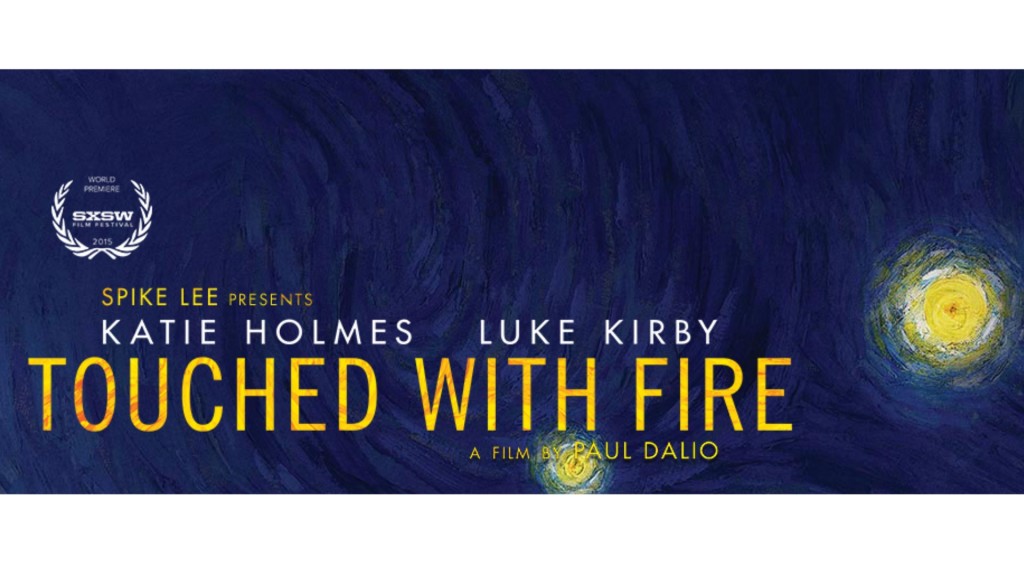 When I received an email recently with an invitation from Mental Health America to attend a free screening of Touched With Fire a new film about bipolar disorder starring Katie Holmes and Luke Kirby, I RSVP'd immediately. It fascinates me to view my illness through the eyes of another person touched by this diagnosis. And this film was written, music composed and was directed by a man who lives with bipolar illness.
When I received an email recently with an invitation from Mental Health America to attend a free screening of Touched With Fire a new film about bipolar disorder starring Katie Holmes and Luke Kirby, I RSVP'd immediately. It fascinates me to view my illness through the eyes of another person touched by this diagnosis. And this film was written, music composed and was directed by a man who lives with bipolar illness.
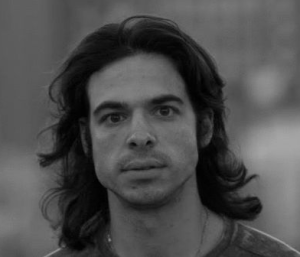 Filmmaker Paul Dalio was diagnosed with bipolar disorder at the age of 24, and like me, struggled to accept the label. He said he romanticized the mania, pointing to famous poets and writers who shared the condition. He's developed a strong sense of pride and I could wholeheartedly relate. It seems his experience over the years has led him to a place I find myself in now: able to live in harmony with bipolar, with a loving family and a full life.
Filmmaker Paul Dalio was diagnosed with bipolar disorder at the age of 24, and like me, struggled to accept the label. He said he romanticized the mania, pointing to famous poets and writers who shared the condition. He's developed a strong sense of pride and I could wholeheartedly relate. It seems his experience over the years has led him to a place I find myself in now: able to live in harmony with bipolar, with a loving family and a full life.
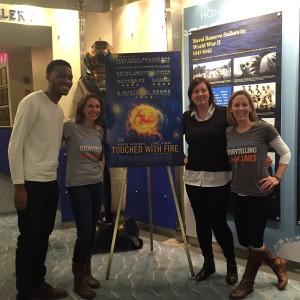
Several of my volunteers and one of our new This Is My Brave interns joined me at the screening. We all were impressed by the film, it's ability to express the artistic side of the disease, how family members struggle with how to help or walk away, and what happens when one refuses to comply with medications and treatment.
Plus, it's a love story. That was probably my favorite part about the movie. And it has a great ending.
I did have a concern as I reflected back on the scenes and the dialogue though. So many moments brought me back to my initial diagnosis and the years that followed.
Like when my parents kept referring to what was happening to me as "episodes" which made me feel so broken.
And when I questioned whether I even had bipolar disorder. I didn't think I needed the meds.
And the times I went off my meds (to protect my unborn babies) only to end up manic and hospitalized within a week both times.
I worry that the film will be dangerous to those who are not in a solid place of recovery. It's been ten years since I've been diagnosed. Coming up on six years since I've had a manic episode requiring hospitalization. I'm at a place where I know that I will never go off my meds. I know what my triggers are and I know how to manage them. I take such better care of my body and my mind compared to where I was back when I was still learning to understand my condition.
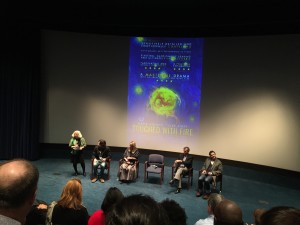
Someone who is early in their recovery journey may be tempted by the film to get rid of meds, to go back to life before being medicated because they were so much more artistic (not true). Paul, the filmmaker, even commented on the fact that he's so much more able to utilize his creativity to attain his goals and dreams being on medication and stable. Something that Dr. Kay Jamison taught him when they met and she became a mentor to him, a connection made possible by his own psychiatrist.
Speaking of Dr. Jamison, she makes a cameo in the movie and I got to say hello to her after the screening and Q & A. I told her how much I admired her work and how I attended one of her book signings in 2007 and asked her about pregnancy and medication. Her advice to me was to stay on my meds, which I did not heed and learned my lesson the hard way. She was very glad to know of the work This Is My Brave is doing and I'm hopeful she'll be able to attend a local show in the near future.
You never know how someone will respond when you put your story out there, when you put your art out into the world. Paul has taken a risk that was no doubt worth taking. My hope is that the film will not live up to my concerns, but instead serve as a springboard for important conversations surrounding mental illness and mental health that need to be taking place in communities everywhere.
The film opens tomorrow, February 12th in New York City and Los Angeles, and on February 19th nationwide in select cities. You can watch a trailer of the film HERE. This Is My Brave is hosting a Meetup for anyone in the DC-metro area who would like to come together to support the film's opening weekend. Click here to sign up to meet us on Friday at the Angelika Film Center in Fairfax for the 7pm-ish showing.
Connections in this heavy life
 Nine years have passed since my life was shattered by depression and anxiety. Tonight, as I sit here typing on my laptop, it's hard to imagine how someone could be suffering so deeply that suicide could seem like the best solution. But nine years ago, I felt the pull to end my life. The pain was too heavy, I couldn't see a future. My world was a mix of meds, doctor’s appointments and therapy appointments. Repeat, repeat, repeat. Just trying to get out of bed in the morning was a monumental feat each day. I couldn’t see hope. I was blinded by my depression. I thought maybe it would be easier to just stop living.
Nine years have passed since my life was shattered by depression and anxiety. Tonight, as I sit here typing on my laptop, it's hard to imagine how someone could be suffering so deeply that suicide could seem like the best solution. But nine years ago, I felt the pull to end my life. The pain was too heavy, I couldn't see a future. My world was a mix of meds, doctor’s appointments and therapy appointments. Repeat, repeat, repeat. Just trying to get out of bed in the morning was a monumental feat each day. I couldn’t see hope. I was blinded by my depression. I thought maybe it would be easier to just stop living.
Fortunately I didn’t sit with those thoughts alone for too long. I was completely ashamed of having those feelings, but something inside me begged my heart to tell my husband and my parents. And so I did. They fought like hell to get me back from the ledge. I do know how lucky i am to have the support system which surrounds me.
My heart breaks for the families and friends of these victims of mental illness. We have so much work to do.
In our day-to-day activities, even simply looking people in the eye and smiling can make a huge difference in someone’s day. You might be the only person who noticed them. We’re so attached to our devices that we barely look up anymore and connect with the people in front of us. I’m totally guilty of it too, but we can change.
Write your way through it
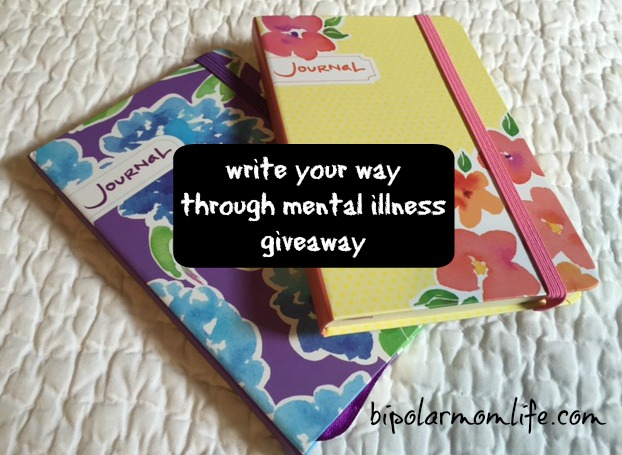 I've been writing in journals ever since I was a tween. Back then they were sparkly little diaries with the lock and key protecting all the secrets inside. I'd write about life and love, about boys I thought I'd fallen in love with but who didn't actually love me back. Or about arguments with my parents or my friends, trying to justify my side of the story.
I've been writing in journals ever since I was a tween. Back then they were sparkly little diaries with the lock and key protecting all the secrets inside. I'd write about life and love, about boys I thought I'd fallen in love with but who didn't actually love me back. Or about arguments with my parents or my friends, trying to justify my side of the story.
I turned to journaling whenever the moment struck me, throughout high school and college, and even once I had graduated and started out on my own in the world. My husband and I traveled Europe for a week together after I completed a 2-week study abroad in Antwerp, Belgium, and I still love flipping back through that play-by-play notebook of our trip. I can almost transport myself back by reading those words.
I never realized how many ways the simple habit of putting pen to paper could actually help someone until it helped me.
When mania threatened to ruin my life with two psych hospitalizations in a month's time, everyone close to me was sent spinning. Psychiatrists, therapists, prescriptions. It was all so new to us.
My husband may have been scared, but he wasn't afraid to stand by my side through the hurricane of what was now our life. My parents, although heartbroken for the pain and uncertainty I was facing, were committed to helping me get well.
In the midst of doctor's visits and the flurry of medications I was put on, I felt out of control. Too much was going on. There were all these symptoms and I didn't know how to describe them. I couldn't pronounce the meds I was on. My mind felt weird.
A week after my second hospitalization, my dad came up with a brilliant idea. He bought me a plain pocket notebook at CVS, and told me to write down the same three things each day: what meds/doses I took each day, any side effects I was experiencing, and how I was feeling. That way, we could work with my doctor to figure out what was going on in my brain and how to get me well.
I kept those journals for four years straight, barely ever missing a day. Some days I'd only write those things my dad said to write, other days I'd write pages and pages. I used it to track my progress. It helped me to recognize my triggers. I learned a great deal about myself through taking the time to put my thoughts down on paper.
It was the start of my writing my way through my mental illness. Which has led me to where I am today. I haven't kept a journal since 2010, since that's when I starting to transition my words online to this blog. But I want to return to it because I recognize how I love looking back at the past, to see how it led to the present.
Being diagnosed with a mental illness can be absolutely terrifying in the beginning. But getting through it doesn't have to feel impossible. It takes time to get to the bottom of things, to figure out what meds work, to start feeling like your old self again once you do find one that works. Trust me, I know.
Also trust the process.
I saw these little journals in a drugstore this week. They reminded me so much of the small Vera Bradley notebooks I transitioned to after I filled up the one my dad bought for me. I bought two, one for me, and one to give away to one of my readers who could use it.

